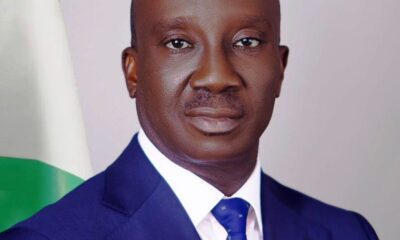Business
NASS And Removal Of CBN’S Autonomy
Two bills are currently pending in the two chambers of the National Assembly seeking to take away the statutory autonomy being enjoyed by the Central Bank of Nigeria (CBN).
The first bill is a proposal by the Senate aimed at compelling the bank to, henceforth, submit its annual budget for consideration by the parliamentarians in order to facilitate fiscal transparency and accountability.
The second one, which has already passed its second reading in the lower chamber, seeks to amend sections of the CBN Act of 2007 which confer operational independence on the bank. The intention here is to allow the lawmakers, rather than the president, exercise the responsibility of appointing the governor and board members of the apex bank.
Even as lame as the reason advanced for the Senate’s proposal sounds, the apparent absence of one from the lower legislature to justify its intention only smacks of reckless vendetta.
Not long ago, the CBN Governor, Lamido Sanusi, had, while on summons before a committee of the Assembly, revealed that over 25 per cent of the national budget is spent on the remunerations of the federal legislators and in servicing the National Assembly.
Naturally, the distinguished members would hear no such heresy. Certainly not one said direct to their faces and on their own very turf, too. What to do? They promptly fired back at Sanusi and his bank staff, accusing them of equally gulping so much from the nation’s annual returns.
And with this unsavoury setting began the lawmakers’ relentless plot to reach for the CBN governor’s jugular and perhaps, unwittingly, the nation’s already aching wind pipe.
In spite of what the excuses may be, most analysts believe that the moves by the National Assembly members to strip the CBN of its autonomy are motivated by sheer political considerations rather than economic expediency. They, therefore, fear that this has the tendency to reduce, if not reverse, whatever successes that may have been achieved through the ongoing banking sector reforms undertaken by the CBN.
Political control of the central bank will be most ill-advised for any country that is keen to attract international investments. It is even more so for Nigeria at this time when the CBN is making a success of macroeconomic stability, essentially through the adept management of its monetary policy instruments.
State control of the CBN will not be in consonance with global best practices as Sanusi reportedly pointed out at a recent public hearing on the Senate bill. According to him, a recent study conducted by his staff on the acts establishing the central banks of 40 countries, including the US, China and South Africa showed Zimbabwe as the only case where parliament approved a central bank’s budget. Of course, everybody knows where such has led the country’s economy.
In some situations, and as was the case in this Southern African nation, a central bank which is controlled by politicians runs the risk of being compelled to abuse its powers to print the local currency if only to help finance the country’s budget deficits, especially in an election year.
The central bank’s supervisory role over commercial banks and other financial institutions will be compromised if politicians or their proxies become board members of such a regulatory authority. This is because most of them are already on the boards of these other institutions and would readily want to intervene in matters that adversely affect such organisations.
But come to think of it, the same federal lawmakers who are clamouring to check the CBN’s fiscal excesses are the very ones whose rank is replete with men and women who are currently being investigated for one financial misdemeanor or the other. Haba!
Ibelema Jumbo
Transport
Nigeria Rates 7th For Visa Application To France —–Schengen Visa

Transport
West Zone Aviation: Adibade Olaleye Sets For NANTA President

Business
Sugar Tax ‘ll Threaten Manufacturing Sector, Says CPPE

In a statement, the Chief Executive Officer, CPPE, Muda Yusuf, said while public health concerns such as diabetes and cardiovascular diseases deserve attention, imposing an additional sugar-specific tax was economically risky and poorly suited to Nigeria’s current realities of high inflation, weak consumer purchasing power and rising production costs.
According to him, manufacturers in the non-alcoholic beverage segment are already facing heavy fiscal and cost pressures.
“The proposition of a sugar-specific tax is misplaced, economically risky, and weakly supported by empirical evidence, especially when viewed against Nigeria’s prevailing structural and macroeconomic realities.
The CPPE boss noted that retail prices of many non-alcoholic beverages have risen by about 50 per cent over the past two years, even without the introduction of new taxes, further squeezing consumers.
Yusuf further expressed reservation on the effectiveness of sugar taxes in addressing the root causes of non-communicable diseases in Nigeria.
-

 Niger Delta5 days ago
Niger Delta5 days agoPDP Declares Edo Airline’s Plan As Misplaced Priority
-

 Sports5 days ago
Sports5 days agoSimba open Nwabali talks
-

 Nation5 days ago
Nation5 days agoHoS Hails Fubara Over Provision of Accommodation for Permanent Secretaries
-
Niger Delta5 days ago
Students Protest Non-indigene Appointment As Rector in C’River
-
Nation5 days ago
Maternal Mortality: RSG Identifies 6 High Risk Local Government Areas
-

 Niger Delta5 days ago
Niger Delta5 days agoOkpebholo Assures Corps Members Of Improved Welfare
-

 News2 hours ago
News2 hours agoTroops Kill Boko Haram Second-In-Command, 10 Fighters In Borno
-

 News2 hours ago
News2 hours agoUrban Nigerians enjoy 40% faster internet than rural users — NCC

